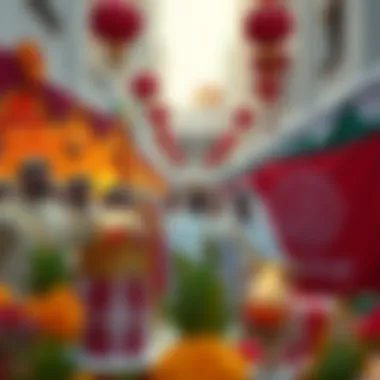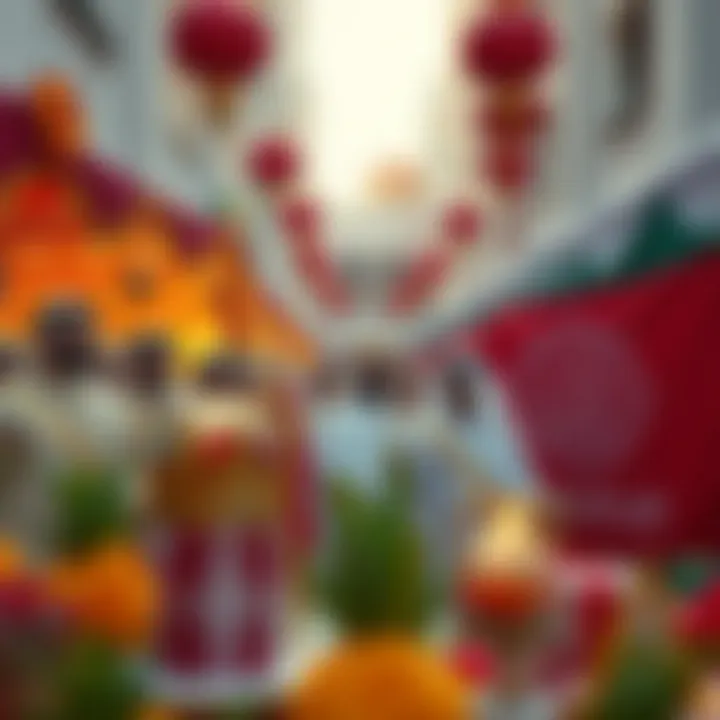Understanding Holidays in the UAE: A Comprehensive Guide


Intro
Holidays in the United Arab Emirates are not just pauses in the routine; they are vibrant spectacles rich in history, culture, and significance. For both residents and visitors, understanding these days offers a window into the soul of a rapidly modernizing nation. The UAE uniquely blends tradition and contemporary life, making its holidays a fascinating intersection of the past and present.
Public holidays here range from Islamic observances like Eid al-Fitr and Eid al-Adha to national celebrations like UAE National Day. Each holiday carries its own traditions and customs, reflecting the deep-rooted values of the society. Additionally, these holidays play a pivotal role in shaping the lifestyle choices of individuals—think about how they affect business operations, social gatherings, and even the real estate market.
In this guide, we aim to navigate the intricate web of holidays in the UAE. Not only will we highlight the cultural significance of these occasions, but we will also delve into the legal framework surrounding holidays, employees' rights, and practical insights for expatriates who wish to engage with the festivities. By the end, readers will have a comprehensive understanding of how these holidays influence various aspects of life across this vibrant nation.
Preface to UAE Holidays
Understanding the significance of holidays in the United Arab Emirates is paramount for anyone looking to grasp the local culture, community values, and social dynamics. In a rapidly evolving society, where traditional customs meet contemporary practices, holidays play a crucial role in embodying the nation’s identity. They act as a beacon, illuminating the rich tapestry of Emirati traditions while also reflecting the diverse backgrounds of expatriates who now call this home.
Celebrations in the UAE are not merely a break from the daily grind; they foster a sense of unity among the people, whether they are Emiratis or expatriates. Moreover, with local holidays often coinciding with significant religious observances, there is a deeper, more profound layer of meaning that underlines their importance. By delving into this topic, we will uncover how these holidays nurture social bonds, reinforce cultural values, and impact various aspects of life, from the workplace to community interactions.
Cultural Significance of Holidays
In the UAE, holidays are more than just days off work; they symbolize collective sentiments and shared beliefs. They are moments where cultural heritage is celebrated, and the essence of Emirati identity shines through. For example, Eid al-Fitr marks the end of Ramadan, a month of fasting and reflection. The communal prayers held in grand mosques, lively family gatherings, and the exchange of gifts, take center stage. These customs not only signify the end of a holy month but also embody the spirit of generosity, kindness, and community.
Moreover, local festivals tied to national identity, like the UAE National Day, celebrate the unification of the seven emirates. Each year, the commemoration spins a tale of resilience, ambition, and hope, bringing together people from various walks of life. Such events are pivotal for social cohesion as they allow individuals to momentarily set aside their differences, embracing a shared narrative that binds them together with a common purpose.
Historical Context
The holidays celebrated in the UAE are deeply rooted in both Islamic traditions and the nation’s history. Looking back, one can see how the origins of these celebratory days reflect the UAE’s journey towards modernization while staying true to its historical roots. The establishment of the union on December 2, 1971, found its way into the national consciousness as a day of pride, leading to the founding of UAE National Day.
Further back, the significance of Islamic holidays is rooted in centuries of tradition. Eid al-Adha, for example, not only commemorates the willingness of Prophet Ibrahim to sacrifice for God but also highlights values such as sacrifice, charity, and gratitude. These historical narratives remain woven into the fabric of the nation's culture, shaping the way holidays are observed today.
"Holidays serve as milestones that connect past to present, uniting communities through a shared sense of history and identity."
In the context of globalization, expatriates have introduced new methods of celebrating or observing certain holidays, leading to an evolution of traditions. Understanding the dual historical influences—both indigenous and introduced—further enriches our comprehension of what holidays mean in the UAE context today.
Types of Public Holidays
Understanding the types of public holidays in the UAE is essential for grasping the rhythm of life in this dynamic nation. The holidays reflect the rich tapestry of cultures, traditions, and values that influence the daily experiences of both locals and expatriates. Public holidays offer unique opportunities for communities to come together, celebrate their heritage, and forge connections among residents from diverse backgrounds.
National Holidays
National holidays in the UAE carry a distinct significance as they mark pivotal events in the country’s journey. These holidays, like UAE National Day, reflect the spirit of unity, pride, and progress that characterize the nation.
Notably, National Day, celebrated on December 2nd, marks the formal unification of the seven emirates. This day is filled with patriotic fervor, as citizens engage in parades, fireworks, and various festivities to express their loyalty. The sense of camaraderie is palpable, creating a unique moment for every resident in the UAE to connect with their identity and the achievements of their nation.
Potential Benefits for Investors and Travelers: National holidays often lead to a surge in tourism and hospitality activities, which can greatly influence market dynamics in real estate sectors, giving investors a view into the seasonal demand fluctuations.
Religious Holidays
Eid al-Fitr
Eid al-Fitr, known as the "Festival of Breaking the Fast," concludes the holy month of Ramadan and holds remarkable importance for Muslims in the UAE and worldwide. It represents gratitude, community bonding, and spiritual reflection. During this festive time, families gather to share meals, exchange gifts, and offer charitable acts.
What sets Eid al-Fitr apart is its emphasis on community; people visit each other's homes, share sweets and traditional dishes, and participate in communal prayers. This holiday not only strengthens family ties but also fosters a sense of belonging among the residents.
For expatriates, Eid provides a window into the Islamic culture, and participating in the festivities can be a rewarding experience. Its communal nature encourages a deeper understanding of local customs and strengthens ties with the community.
Eid al-Adha


Eid al-Adha, known as the "Festival of Sacrifice," honors the willingness of Ibrahim (Abraham) to sacrifice his son in obedience to God. It is celebrated approximately 70 days after Eid al-Fitr and marks the conclusion of the Hajj pilgrimage.
This holiday underscores the values of sacrifice and generosity. Families often share portions of their meat with those less fortunate, making it a day of giving and compassion. Unique here is the focus on shared experiences, as many Muslim families cook traditional dishes and gather to celebrate.
Eid al-Adha creates opportunities for cultural exchange and understanding among expatriates and Emiratis alike. Engaging in local ceremonies and traditions deepens the appreciation of the diverse cultural landscape of the UAE.
Islamic New Year
The Islamic New Year celebrates the migration of the Prophet Muhammad to Medina, marking the start of the Hijri calendar. It is less festive compared to Eid celebrations but holds immense cultural and spiritual significance. Typically observed with reflection and prayer, it encourages people to contemplate their journey and make resolutions for the year ahead.
For expatriates, the Islamic New Year may provide a chance to engage with local traditions in a more subdued environment. It can foster a deeper understanding of the cultural importance of time and spirituality in the UAE society.
Other Observances
Commemoration Day
Commemoration Day, held on November 30th, honors the valiant men and women who sacrificed their lives for the UAE. It serves as a reminder of national unity and respect for those who have served their country.
On this day, residents participate in remembrance ceremonies, conveying gratitude to the fallen heroes. The significance of Commemoration Day is not only in remembrance but also in fostering a sense of national pride and identity among the population.
International Workers' Day
International Workers' Day observed on May 1st celebrates the contributions of workers to society. In the UAE, it often spotlight the significance of labor rights and worker welfare amidst the growing expatriate population. This observance catalyzes discussions about fair labor practices and the rights protected under local laws.
For expatriates, participating in this observance can underscore the importance of respect and rights in the workplace. It encourages a deeper dialogue about diversity and contributions across various sectors, influencing the socio-economic landscape of the UAE.
By exploring these types of public holidays in the UAE, one uncovers layers of cultural richness and societal values that drive community engagement and commerce, particularly in the real estate market.
Legal Framework Surrounding Holidays
Understanding the legal framework surrounding holidays in the UAE is crucial for various stakeholders, including employees, employers, and expatriates. This section sheds light on employee rights, holiday entitlements, and the ripple effects these regulations have on workplaces and local economies. The absence of clear legalities can often lead to misunderstandings or disputes, making it essential to comprehend this landscape.
Employee Rights and Entitlements
In the UAE, employees are entitled to specific rights during holidays as per the labor laws set forth by the Ministry of Human Resources and Emiratisation. Notably, employees are entitled to paid leave on public holidays, which includes National Day, Eid celebrations, and other officially recognized days. Here’s a succinct overview of these entitlements:
- Full-time employees receive at least 30 calendar days of paid annual leave after a year of service.
- Paid holidays are granted without any deductions from the salary, maintaining the employee's income during festive occasions.
- Employees working during holidays are typically entitled to additional pay, which might be double their basic salary, depending on the agreement with the employer.
The recognition of holidays reflects the UAE's culture and values, allowing individuals to observe traditions while retaining their economic stability. Comprehending these rights helps expatriates navigate their work environment more effectively while advocating for fair treatment.
Impact of Holidays on Work Schedule
Holidays considerably influence work schedules, often leading to shortened business hours or a complete halt in operations. In many sectors, especially retail and hospitality, businesses may have to recalibrate their staffing, balancing between meeting customer needs and complying with local regulations.
Some key points regarding work schedules in the context of holidays include:
- Flexibility: Employers often rearrange shifts or provide compensatory time off for employees who work during holidays.
- Increased demand for services: Certain industries, particularly tourism, experience a boom during holidays, necessitating extra staffing, which can lead to over-time arrangements for workers.
- Potential decrease in productivity: The festive atmosphere can lead to distractions. Many employees might be preoccupied with celebrations or travel, thus affecting their work output.
Traditions and Customs
Holidays in the UAE are not just a break from regular life; they are rich in tradition and custom. These aspects provide insight into the local culture, fostering a sense of community among residents and visitors alike. Understanding these traditions helps both expatriates and tourists appreciate the deeper meaning behind the celebrations, forging connections and interactions that might otherwise go unnoticed.
Celebratory Practices
Traditional Foods


Busying the kitchen with a myriad of aromas, traditional foods play a significant role during holidays in the UAE. Each holiday brings unique dishes that reflect the rich heritage of the region. For instance, during Eid al-Fitr, the sweet treat known as maamoul, a date-filled pastry, becomes a staple. This is not just delightful to taste—it's a symbol of sharing and generosity, crucial in a culture that values hospitality.
The preparation of meals becomes a family affair, allowing people to bond over cooking and celebrating their culinary culture. The communal aspect of sharing traditional dishes fosters connections, making each bite more than just food; it's a memory in the making.
However, it’s essential to note that while traditional foods are beloved, they might pose challenges for those unaccustomed to their distinct flavors and cooking methods. For expatriates, the essence of these foods can vary greatly from what they're used to, sometimes leading to a steep learning curve in the kitchen.
Community Gatherings
Community gatherings are another cornerstone of holiday celebrations in the UAE. Whether it's family, friends, or neighbors, the spirit of togetherness takes priority. During events like National Day, people flock to parks and open spaces, uniting with laughter, music, and dance.
These gatherings extend beyond socializing; they serve as a means for cultural exchange. Most notably, they create an environment where traditions are passed down, ensuring that the youth stay connected to their heritage. The atmosphere often encourages expatriates to join in, providing them an opportunity to integrate with local customs and traditions.
However, not every gathering is all roses. Some may feel overwhelmed by the size or energy, especially in cosmopolitan areas like Dubai, where expats can sometimes feel like outsiders. Yet, immersing oneself in these gatherings often proves rewarding, as it opens doors to new friendships and experiences.
Festive Decorations
The flair of festive decorations is visually striking during holidays. Streets, homes, and public spaces come alive with a burst of colors, banners, and lights, each telling a story of the holiday's significance. The exuberance of decor reflects the spirit of the community—joy, pride, and a collective celebration of identity.
During Ramadan, for example, homes are adorned with intricate lanterns that symbolize light and guidance. This physical representation of festivity enhances the atmosphere, turning the ordinary into the extraordinary.
Despite their appeal, some may find the decorations a tad excessive. Balancing traditional elements with modern aesthetics can sometimes lead to confusion or dilution of cultural meanings. Yet, these festive touches ultimately serve to unite people in a shared experience of celebration.
Religious Observances
Religious observances around the holidays draw even deeper into the fabric of UAE culture. The essence of these practices extends beyond rituals; they embody a sense of reflecting on one's faith and community. Each holiday calls for unique observances that vary in significance and practice, rooted in Islamic traditions and values.
Festivities such as Eid al-Adha involve prayers, charitable giving, and communal festivals. These acts emphasize the importance of togetherness and generosity, echoing throughout the celebrations.
Understanding these practices not only enlightens expatriates about the why behind the what, but it also strengthens bonds between different cultures living in the UAE.
"Shared traditions make for a stronger community, ensuring everyone feels they belong, regardless of where they're from."
In summary, Traditions and Customs play an essential role in shaping the holiday experience in the UAE. They tie individuals to their cultural roots while offering opportunities for newcomers to integrate into their environment. Recognizing and respecting these traditions can make all the difference in experiencing the dynamic landscape of UAE holidays.
Era of Expatriates and Holidays
In the vibrant tapestry of the UAE, the presence of expatriates significantly molds the fabric of society, and this directly relates to how holidays are observed. The holidays of the United Arab Emirates not only reflect local traditions but also create a platform where diverse cultures interlace. The role of expatriates during these celebrations adds depth to the understanding of holidays here. From the bustling streets of Dubai to the peaceful corners of Abu Dhabi, expatriates contribute to the uniqueness of holiday experiences in the region.
Challenges Faced by Expatriates
Expatriates in the UAE encounter a myriad of challenges when working and living in this multicultural society, particularly during the holiday seasons. Firstly, there can be a profound sense of cultural dislocation. For instance, many expatriates find themselves missing celebrations from their home countries—such as Thanksgiving in the US or Diwali in India. These sentiments can amplify feelings of isolation, especially during festive times when families and friends gather across the globe.
Moreover, navigating local customs may pose a challenge. Not every holiday in the UAE is marked by public celebrations; understanding different observances and their significance can be complex. For example, expatriates working in the tourism or hospitality sectors must grasp when peak seasons coincide with local holidays, impacting service offerings and guest experiences.
Additionally, many expatriates may face logistical issues, such as visa regulations and employment contracts that restrict their time off during certain holidays. This can limit their ability to engage fully in the festivities. The situation becomes even more challenging when holidays coincide with work responsibilities, curbing their participation in local and community celebrations.
"Expatriates often feel torn between embracing local culture and maintaining their traditions, especially during holidays."
Integration into Local Customs
For expatriates, embracing local customs during holidays enhances their experience but requires sensitivity and willingness to adapt. To truly integrate into the holiday spirit of the UAE, expatriates should make an effort to understand the significance of local holidays, such as Eid al-Fitr or the UAE National Day. For example, participating in community events and family gatherings can provide insights into traditions, such as the sharing of special dishes or attending cultural performances.
Engaging with Emirati colleagues or neighbors can foster relationships that bridge cultural gaps. For instance, offering a friendly greeting like "Eid Mubarak" or participating in local bazaars during festive periods illustrates a respect for Emirati culture, which can lead to deeper connections with the local community.
Moreover, expatriates can also contribute their own cultural practices during occasions like International Workers’ Day, showcasing the importance of multiculturalism. By blending traditions, they foster a sense of belonging while enhancing their social experience in the UAE.


Impact of Holidays on the Real Estate Market
The relationship between holidays and the real estate market in the UAE is a subject worth examining. Holidays can significantly influence various aspects of this sector, including property demand, rental trends, and overall market dynamics. For both investors and homebuyers, understanding these impacts can provide valuable insights into timing their next moves in the property game.
Seasonal Trends
Seasonal trends in real estate are often punctuated by holidays, with influences measurable in various metrics.
- Increased Demand: Major holidays like Eid al-Fitr and Eid al-Adha often see a spike in real estate activities. This timeframe attracts both local buyers and expatriates returning to the UAE for celebrations. It leads to increased interest in short-term rentals, especially in popular tourist destinations such as Dubai and Abu Dhabi.
- Rental Fluctuations: During specific holidays, the demand for short-term rentals tends to soar. Owners of properties in prime locations can raise rental prices due to higher demand. Conversely, the days immediately following holidays might see a dip as travelers leave, impacting rental incomes.
- Market Sentiment: The festive spirit during holidays often blankets the market with an air of optimism. Events related to holidays can attract buyers, spurring them to make quick decisions, which can temporarily elevate market prices and reduce inventory.
Holiday seasons can also affect construction timelines. In the run-up to holidays, there might be a slowdown in construction activities as workers take leave. Knowing when to expect these lulls helps stakeholders plan effectively for buying, selling, or renting properties.
Leisure and Tourism Influence
The connection between holidays and tourism cannot be overlooked. Especially in a nation like the UAE, where tourism plays a central role in the economy, holidays can significantly affect the real estate landscape.
- Increased Tourist Inflows: During public holidays, an influx of tourists and expatriates not only leads to higher rental demand but also boosts property investments in the hospitality sector. Investors might find opportunities in developing properties that cater to the tourism surge, such as serviced apartments or vacation homes.
- Exhibiting Local Culture: Holiday celebrations often include grand events, festivals, and fireworks displays, which draw tourists and real estate investors. These activities can enhance a location's attractiveness, leading to increased property values in those areas. For example, properties near popular festivals experience price surges as they provide easy access to event venues.
- Impact on Commercial Spaces: Retail and leisure sectors also see a marked improvement during holidays, as spending increases among both locals and tourists. Properties accommodating restaurants, cafes, or entertainment venues witness enhanced foot traffic, which can significantly increase their market value and rental potential.
Consistent exposure to holiday-driven tourism can provide long-term benefits in the desirability and value of real estate projects.
Best Practices for Travelers
Traveling to the UAE during holidays can be an exhilarating experience, but knowing the ropes can make it all the more enjoyable. The dynamic culture and exciting festivities happen during these times, yet they can come with their own set of challenges. This section focuses on best practices for travelers, emphasizing preparation and cultural respect.
Planning Ahead
Planning ahead is essential when visiting the UAE during holidays. While the buzz of festivals can be intoxicating, the reality is that transportation, accommodation, and activities require foresight. Everyone and their uncle seems to descend on popular areas during holidays, leading to packed venues and higher prices. Here are several key considerations:
- Book Early: Whether it’s hotels or flights, it’s wise to secure your arrangements well in advance. Prices can skyrocket as the holiday approaches. You don’t want to be left scrambling for a place to stay when the best options are gone.
- Understand Holiday Dates: The Islamic calendar is lunar-based, so exact holiday dates can shift. Be sure to check official announcements or reliable local resources to keep your travel plans aligned with these dates. Websites such as gulfnews.com often provide updated information.
- Timing is Everything: Public transport might run less frequently during holidays. If you plan to use the metro or buses, be sure to check the holiday schedule.
- Expect Crowds: Major events attract large crowds; thus, managing expectations is key. If intense crowds aren't your thing, consider visiting smaller towns or areas away from the main festivities.
Respecting Local Customs during Holidays
Understanding and respecting local customs during holidays is not just polite—it’s a vital component of a gratifying experience in the UAE. The local customs are a reflection of the rich history and traditions of the region. Here are critical points to keep in mind:
- Dress Code Matters: The UAE has a conservative dress code, especially during religious holidays. Women may wish to wear loose-fitting attire that covers shoulders and knees, while men should opt for long pants and shirts with sleeves.
- Be Mindful of Ramadan: If your travel coincides with Ramadan, respect the fasting rules. Eating and drinking in public during daylight is frowned upon. Find spaces to eat discreetly if necessary, or join local iftar events.
- Participate in Traditions: Engage with local customs when invited. Whether it’s feasting, prayer, or community activities, showing interest will enrich your experience. Plus, it demonstrates respect for the culture.
Respect and understanding will lead to a more fulfilling travel experience and deeper appreciation of the vibrant culture.
- Avoid Offensive Behavior: During holidays, public displays of affection and loud celebrations may not be well-received. Be conscious of behavior in public spaces to maintain respect for local traditions.
Closure
The conclusion of this comprehensive guide encapsulates the multifaceted nature of holidays in the UAE, illustrating their intrinsic value to both residents and visitors. These holidays encompass a blend of cultural heritage and societal norms which reflect the nation’s character.
Summary of Insights
Diving into the different aspects of holidays reveals their significance beyond mere days off from work. Through festivals like Eid al-Fitr and National Day, we see a vibrant tapestry of cultural expressions, weaving together various traditions and communal practices.
Moreover, the economic implications of holidays cannot be overstated. They affect various sectors, including tourism and real estate, while shaping the local lifestyle. Understanding employee rights related to time off and pay during holidays allows for a clearer picture of workplace dynamics.
To summarize:
- Cultural Essence: Holidays act as a window into the UAE's rich traditions and values.
- Economic Impact: Recognizing how holidays spur leisure activity can be invaluable for investors and developers.
- Social Interactions: For expatriates, blending into local holiday customs is pivotal for fostering a sense of community.
Future of Holidays in the UAE
Looking ahead, the landscape of holidays in the UAE is likely to evolve. As the nation continues to diversify, emerging trends may reshape the way these occasions are celebrated. Increased globalization means that more international celebrations might find their way into the UAE’s cultural mix.
Furthermore, the rise of social media plays a significant role in shaping perceptions of holidays. From sharing holiday experiences online to fostering global conversations, the digital age could introduce fresh perspectives and traditions.
The possibility of new holidays being recognized is another consideration. As communities grow and change, so too will their commemorations.



